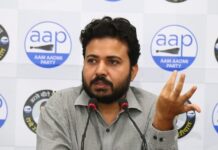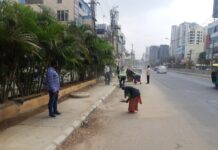
Ranchi, Prime Minister Narendra Modi on Sunday launched the ‘Ayushman Bharat – Pradhan Mantri Jan Aarogya Yojana (AB-PMJAY)’ here, hailing it as the “worlds biggest state-run healthcare scheme”.
Launching the scheme, Modi said the intended beneficiaries outnumber the total population of the European Union or that of the USA, Canada and Mexico put together.
Modi said that the scheme, which targets more than 50 crore people, will be a subject for research for medical and social scientists and a model for the world to follow. He had announced AB-PMJAY in his Independence Day speech.
Without taking names, Modi used the occasion to target the Congress for “using schemes for the sake of vote-bank politics”.
“Since long, we have been hearing the slogan of ‘gareebi hatao’ (abolish poverty) but they only indulged in politics of poverty, politics of vote bank. They were only giving out freebies to the poor instead of empowering them.
“Previous governments’ schemes were guided by vote bank, with the beneficiaries selected on the basis of potential vote bank for them. But we strive for the empowerment of the poor. We believe in inclusive growth. The scheme is not aimed at benefiting a particular region or community or caste. It is for all, for the poorest of poor. The poor don’t want freebies, they have self-respect and seek empowerment. We work for their empowerment,” he added.
Modi also laid the foundation stone of medical colleges at Chaibasa and Koderma in Ranchi, and distributed e-card, a unique helath identity card, to the beneficiaries of PMJAY.
Jharkhand Governor Draupadi Murmu, Chief Minister Raghubar Das and Union Ministers J.P. Nadda and Jayant Sinha were present on the occasion.
The scheme will provide a cover of up to Rs 5 lakh per family per year, for secondary and tertiary care hospitalisation through a network of Empanelled Health Care Providers (EHCP).
The EHCP network will provide cashless and paperless access to services for the beneficiaries at both public and private hospitals.
The services will include 1,350 procedures covering pre- and post-hospitalisation, diagnostics and medicines.
Ayushman Bharat has two components — creation of 150,000 health and wellness centres which will provide Comprehensive Primary Health Care (CPHC) and the PMJAY which provides health protection cover to poor and vulnerable families for secondary and tertiary care.
The first Health and Wellness Centre was launched by Modi at Jangla, Chhattisgarh on April 14.
PMJAY primarily targets the poor, deprived rural families and identified occupational category of urban workers’ families as per the latest Socio-Economic Caste Census (SECC) data for both rural and urban areas as well as the active families under the Rashtriya Swasthya Bima Yojana (RSBY).
The objectives of the scheme are to reduce out of pocket hospitalisation expenses, fulfil unmet needs and improve access of identified families to quality inpatient care and surgeries.
The scheme allows states enough flexibility in terms of packages, procedures, scheme design, entitlements as well as other guidelines while ensuring that key benefits of portability and fraud detection are ensured at a national level.
States have the option to use an existing trust/society or set up a new trust/society to implement the scheme as State Health Agency and will be free to choose the modalities for implementation.
It can implement the Scheme through an insurance company or directly through the trust/society/implementation support agency or a mixed approach.
Pilot launch of the scheme has already been done in around 22 states and Union Territories. About 30 states and union territories have signed a Memorandum of Understanding and started working on implementating the mission.








